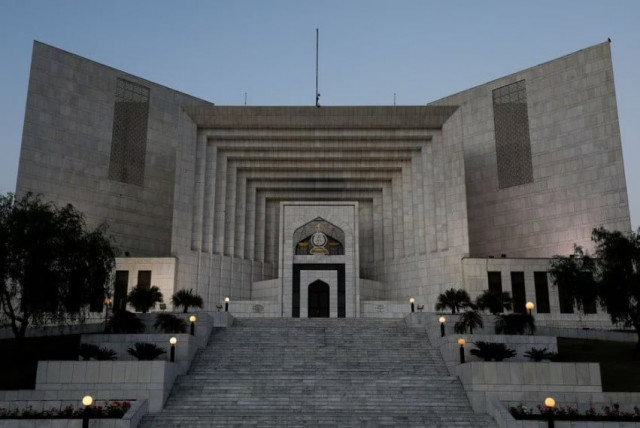Centre, provinces told to ensure prisoner rights
Failing to release inmate on probation in accordance with law violation of fundamental rights, reads SC judgment

The Supreme Court on Tuesday directed the chief executives of the federal and provincial governments to ensure that laws relating to the rights of inmates, especially their release on the basis of probation, are effectively implemented and made functional.
A five-page judgment authored by Justice Athar Minallah stated that it was the right of every eligible prisoner to be considered for the purposes of enjoying liberty on the basis of probation.
The neglect of the executive authorities to perform their obligations and duties imposed by law and to give effect to the enforced laws, particularly relating to the inmates of prisons amounts to a breach of the duty of care that is owed to the incarcerated prisoner.
This breach of fiduciary duty could expose the concerned authorities and the state to be sued by the inmates of the overcrowded prisons for damages.
A division bench of the apex court led by former Chief Justice of Pakistan (CJP) Umar Ata Bandial had heard the matter.
Read No doctor for inmates in 10 Balochistan prisons
In its verdict, the court declared that neglect or refusal to effectively enforce enacted laws relating to the release of a prisoner on the basis of probation is violative of the fundamental rights guaranteed under the Constitution, inter alia, under Articles 9, 10-A, 14 and 25.
"The federal and provincial governments, as the case may be, shall ensure that the prisoners who are eligible under the enacted laws for availing the benefit of being released on probation are identified and their cases are processed expeditiously," states the judgment.
"In the circumstances and the context of unjustified deprivation of the right to liberty, the benefit of enjoying release on the basis of probation is of pivotal importance and thus the enforcement of the laws relating to probation become crucial," it adds further.
The order said that these proceedings stem from the order, dated November 11, 2015, whereby the apex court had sought reports from the federal and provincial governments regarding the status of implementation of the enforced enacted laws relating to the release of inmates from prisons on the basis of ‘probation’.
The reports, submitted by the respective governments and the secretary of the Law and Justice Commission of Pakistan - hereafter referred to as the commission - have been perused. The latter, in its report, has raised crucial questions regarding the inability of the respective governments to extend the benefit of release provided under the relevant enforced laws.
Read more Under-trial prison population increases after PTI arrests
Justice Minallah noted that the proceedings before the SC and the reports submitted by the respective governments manifest that grave conditions affecting fundamental rights prevail in the prisons across the country.
"It is an undeniable fact that living conditions and the treatment of prisoners in overcrowded and inadequately equipped prisons profoundly affects the constitutionally guaranteed rights. Most of the victims of a non-functional criminal justice system are those who belong to economically and socially marginalized sections of society. They do not have the means to access the courts nor has the state fulfilled its constitutional obligation to ensure inexpensive and expeditious justice contemplated under Article 37(d) of the Constitution of the Islamic Republic of Pakistan, 1973," read the order.
"Justice is denied to the weak and vulnerable because the prevailing criminal justice system allows its exploitation by the privileged and those who wield influence. The abysmal conditions in the prisons are intolerable in a society governed under a Constitution. The prisons exist as institutions for the reformation and social rehabilitation of those prisoners who have been convicted by a competent court following a fair trial," it added further.
"The prisoner has been defined as a person legally committed to a prison as a punishment for a crime or while awaiting a trial. There are mainly two categories of prisoners i.e. convicted or non-convicted," noted the judgment.
Further read No conjugal visits for inmates in Sindh’s jails
"The latter is presumed to be innocent till guilt is established by a competent court of law. The convicted
prisoners are imprisoned because they are required to undergo a period of sentence. The object of undergoing a sentence pursuant to being convicted by a competent court of law is to make the convicted person and others realize that what the former has done or his/her acts, omission, and conduct which have led to the conviction or handing down of the sentence were unacceptable.
"The sentence deprives a prisoner of his or her liberty and the freedom to be free and this curtailment of liberty may have limited consequences regarding some other rights. A non-convicted prisoner retains the presumption of innocence, which is an integral and fundamental part of the right to a fair trial.
"The prisoner, whether convicted or non-convicted, has no choice but to place reliance for his right to life and other needs, such as medical attention, solely on the authorities holding him or her in custody.
"This reliance gives rise to a duty of care on the part of the State and its functionaries. The Constitution guarantees the right to life under Article 9. In the context of a prisoner, it is implicit in Article 9 that it is the duty of the State to ensure that every person incarcerated including those who are convicted for an offence and undergoing sentence, are treated in a manner that does not expose the latter to harm and that humane treatment is extended so long as the incarceration lasts.
"The prisoner is thus entirely dependent on the State and is at its mercy for the purposes of safeguarding the right to life. The State, therefore, owes a duty of care to every prisoner, regardless of the nature of the offence for which the latter has been incarcerated.
"It is only liberty and the right of free movement that has been curtailed and definitely not the constitutional rights to life and to be treated with respect, having regard to the fundamental rights of inviolability of the dignity of man guaranteed under Article 14 of the Constitution. Moreover, it becomes a duty of the functionaries to ensure that no prisoner is unjustifiably deprived of the right to liberty even if it is on the basis of being released on probation."



















COMMENTS
Comments are moderated and generally will be posted if they are on-topic and not abusive.
For more information, please see our Comments FAQ